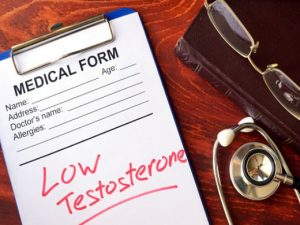
Low testosterone can reduce libido, increase weight gain, cause low energy, hair loss, changes in mood, and loss of bone.
On the other hand, as new research outlines, there may be a benefit to low testosterone and it involves men’s cancer risk.
Low testosterone linked to low prostate cancer risk
The study was carried out by researchers at the University of Oxford and was the largest study of its kind to explore testosterone levels and prostate cancer risk.
In the U.S., prostate cancer affects nearly 170,000 males with 30,000 men dying from it annually. Risk factors linked to prostate cancer include age, ethnicity, family history, and genetic mutations.
It is known that male hormones like testosterone can promote tumor growth in prostate cancer. Therefore, reducing testosterone levels in patients can slow down tumor growth.
It is believed that saturation of testosterone promotes cancer cell growth, but only to a certain point. Once saturation has reached the point of tumor growth, any additional increases in testosterone would not speed up growth. The authors explained, “Because the saturation point is thought to be low, until now there have been insufficient prospective data available to test this theory.”
The researchers wanted to explore this theory further in over 19,000 men. Of the data, 6,993 men had prostate cancer and 12,088 were healthy controls. Men were categorized into 10 groups based on testosterone levels.
Men with the lowest testosterone were less likely to develop prostate cancer by at least 20 percent. In men with prostate cancer, those with low testosterone were 65 percent less likely to have an aggressive form.
Prostate cancer specialist Professor Malcolm Mason added, “Testosterone’s role in prostate cancer’s development has been a hotly debated area of research, so it’s great to see some strong evidence. This puts another piece of the jigsaw into place in terms of understanding the biology of what causes prostate cancer.”
Co-author of the study Professor Tim Key explained, “This is an interesting biological finding that could help us understand how prostate cancer develops and progresses. Until now, we didn’t have a clear idea of the role testosterone played in prostate cancer risk. This is the first population study to support the theory that risk is lowered below a certain threshold of the hormone.”
Additional studies could help reduce men’s risk of prostate cancer along with opening up new approaches to prostate cancer treatment.
Also Read: How to keep your prostate healthy